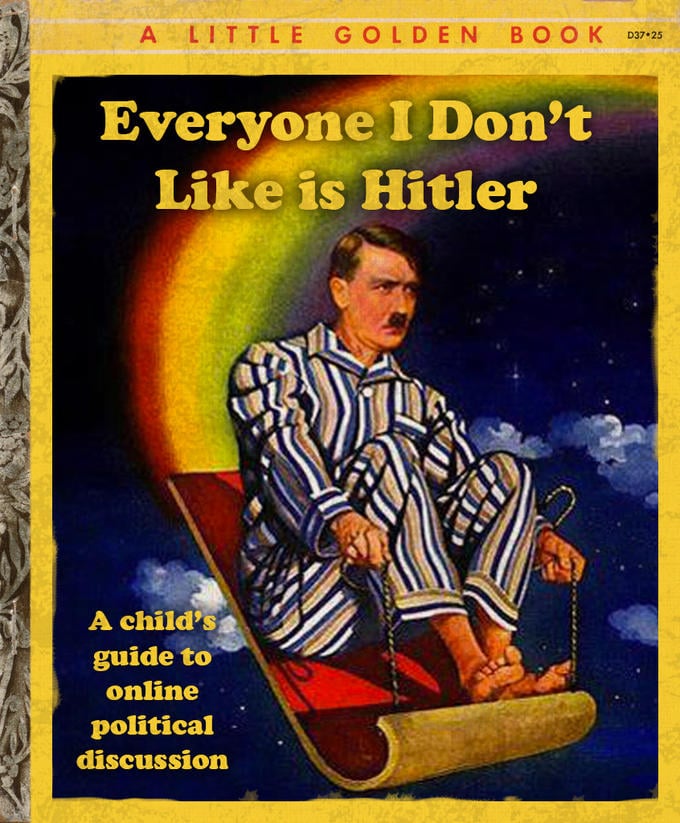For those who actually want fascism to mean something, Umberto Eco's 14 key points of Ur-Fascism are handy:
-
"The cult of tradition", characterized by cultural syncretism, even at the risk of internal contradiction. When all truth has already been revealed by tradition, no new learning can occur, only further interpretation and refinement.
-
"The rejection of modernism", which views the rationalistic development of Western culture since the Enlightenment as a descent into depravity. Eco distinguishes this from a rejection of superficial technological advancement, as many fascist regimes cite their industrial potency as proof of the vitality of their system.
-
"The cult of action for action's sake", which dictates that action is of value in itself and should be taken without intellectual reflection. This, says Eco, is connected with anti-intellectualism and irrationalism, and often manifests in attacks on modern culture and science.
-
"Disagreement is treason" – fascism devalues intellectual discourse and critical reasoning as barriers to action, as well as out of fear that such analysis will expose the contradictions embodied in a syncretistic faith.
-
"Fear of difference", which fascism seeks to exploit and exacerbate, often in the form of racism or an appeal against foreigners and immigrants.
-
"Appeal to a frustrated middle class", fearing economic pressure from the demands and aspirations of lower social groups.
-
"Obsession with a plot" and the hyping-up of an enemy threat. This often combines an appeal to xenophobia with a fear of disloyalty and sabotage from marginalized groups living within the society. Eco also cites Pat Robertson's book The New World Order as a prominent example of a plot obsession.
-
Fascist societies rhetorically cast their enemies as "at the same time too strong and too weak". On the one hand, fascists play up the power of certain disfavored elites to encourage in their followers a sense of grievance and humiliation. On the other hand, fascist leaders point to the decadence of those elites as proof of their ultimate feebleness in the face of an overwhelming popular will.
-
"Pacifism is trafficking with the enemy" because "life is permanent warfare" – there must always be an enemy to fight. Both fascist Germany under Hitler and Italy under Mussolini worked first to organize and clean up their respective countries and then build the war machines that they later intended to and did use, despite Germany being under restrictions of the Versailles treaty to not build a military force. This principle leads to a fundamental contradiction within fascism: the incompatibility of ultimate triumph with perpetual war.
-
"Contempt for the weak", which is uncomfortably married to a chauvinistic popular elitism, in which every member of society is superior to outsiders by virtue of belonging to the in-group. Eco sees in these attitudes the root of a deep tension in the fundamentally hierarchical structure of fascist polities, as they encourage leaders to despise their underlings, up to the ultimate leader, who holds the whole country in contempt for having allowed him to overtake it by force.
-
"Everybody is educated to become a hero", which leads to the embrace of a cult of death. As Eco observes, "[t]he Ur-Fascist hero is impatient to die. In his impatience, he more frequently sends other people to death."
-
"Machismo", which sublimates the difficult work of permanent war and heroism into the sexual sphere. Fascists thus hold "both disdain for women and intolerance and condemnation of nonstandard sexual habits, from chastity to homosexuality".
-
"Selective populism" – the people, conceived monolithically, have a common will, distinct from and superior to the viewpoint of any individual. As no mass of people can ever be truly unanimous, the leader holds himself out as the interpreter of the popular will (though truly he alone dictates it). Fascists use this concept to delegitimize democratic institutions they accuse of "no longer represent[ing] the voice of the people".
-
"Newspeak" – fascism employs and promotes an impoverished vocabulary in order to limit critical reasoning.

My favorite is the "BLUE LINE BLUE LIVES MATTER" types also having a tacky "COME BACK WITH A WARRANT" doormat and constantly fantasize about taking out "government thugs" who come to "take their guns".
PICK ONE DIPSHITS
This makes more sense in the context that they believe that they're in the in group that the law should protect yet not bind, and everyone else that the cops are for are in the out-group that the law should bind and not protect. That's why there's this breathless disbelief that the J6ers and Trump have been prosecuted, and further disbelief that it's in any way legitimate.
I pick the line about dipshits.